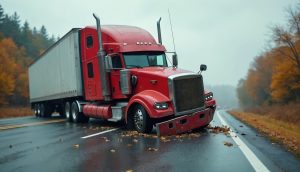7 Common Types of Truck and 18-Wheeler Accidents
 A crash involving a big rig can change or even end a life in seconds. These commercial vehicles can weigh up to 80,000 pounds, so it’s no surprise that they can cause significant property damage and leave victims with life-threatening injuries.
A crash involving a big rig can change or even end a life in seconds. These commercial vehicles can weigh up to 80,000 pounds, so it’s no surprise that they can cause significant property damage and leave victims with life-threatening injuries.
Understanding how truck and 18-wheeler accidents happen is the first step toward safeguarding your legal rights in Arkansas. Below, we’ll discuss the seven most common types of accidents, their likely causes, and the options available for the victim to seek compensation.
Types of accidents
Rear-end collisions
Due to a truck’s size and weight, when it strikes the back of another vehicle, it can be detrimental to the occupants of the smaller vehicle. Most times, rear-end collisions happen because the truck is following too closely or the vehicle suddenly stops in front of the truck.
T-Bone or side-impact accidents
T-bone accidents happen when a trucker runs into the side of another vehicle, forming a capital “T” shape. These are particularly dangerous because most cars don’t have side protection. Side-impact accidents often occur at intersections when a truck driver either fails to yield or runs a red light.
Head-on collisions
Head-on crashes involve the front of a truck colliding with the front of another vehicle. These are among the deadliest types of accidents due to the combined speed and force. Head-on collisions are typically the result of trucker fatigue, impaired driving, or loss of control.
Jackknife accidents
When a truck’s trailer swings out to form a sharp angle with the cab, it resembles a folded knife. Hence, the name. Sudden braking or simply driving on slippery roads can force the trailer into such a position. It may collide with nearby vehicles or block traffic.
Truck rollovers
Rollovers happen when a truck tips onto its side or roof. Sharp turns, uneven cargo loading, or slippery conditions are just some circumstances that can cause a truck to roll over. Rollovers can lead to cargo spills and pose hazards to other drivers.
Blind-spot or “no-zone” accidents
Trucks have “no-zones” or a large “blind-spot” where smaller vehicles are difficult or even impossible to see. If drivers stay in these locations for too long and the trucker changes lanes or turns without seeing them, accidents can occur.
Wide-turn accidents
Trucks are much longer than the average vehicle. Naturally, they require more space to make turns. When a truck driver swings out to make a turn, it can strike nearby vehicles. Wide-turn accidents are most common in urban areas, as intersections are usually tight.
Factors that contribute to truck and 18-wheeler accidents
It’s essential to understand how these accidents are caused. Knowing the likely causes is key to prevention and to holding responsible parties accountable.
Driver fatigue and negligence
Drowsy driving is a significant risk factor for big rig crashes. Truckers often face pressure to meet delivery deadlines and find themselves behind the wheel for long periods. Although the Federal Motor Carrier Safety Administration (FMCSA) sets limits on how long drivers can operate without rest, drivers may violate these limits, creating a heightened risk of crashes. Unfortunately, a lack of sleep can slow reaction times and impair judgment, increasing the risk of a crash.
Driver fatigue isn’t the only form of driver negligence. Other common types include speeding, distracted driving, driving under the influence of drugs or alcohol, and aggressive or reckless driving. Negligence can also extend to the trucking company if they improperly trained or failed to train and monitor their driver.
Poor weather conditions
There’s nothing a truck driver or trucking company can do about bad weather. Rain, fog, and icy roads, conditions that Arkansas frequently experiences, make driving particularly hazardous. According to NHTSA statistics, weather is a factor in many large truck crashes, especially in rural areas. Even cautious truckers can find themselves struggling to maintain when road conditions rapidly deteriorate.
Inadequate maintenance and improper cargo loading
Maintenance failures and unsafe loading practices, both of which are areas regulated by FMCSA, can support truck accident claims. By law, truckers are required to conduct regular inspections. When fundamental truck components such as brakes or tires aren’t properly maintained, accidents are bound to happen. Likewise, when cargo is overloaded, unevenly distributed, or poorly secured, it increases the chance of jackknife accidents, rollovers, and cargo spills.
Road conditions
The everyday driver faces road hazards like potholes, faded lines or signage, or narrow shoulders. When truck drivers experience these same hazards, the risks are amplified due to the size and weight of their vehicles.
The Arkansas Department of Transportation monitors and works to improve road safety by maintaining and repairing aging infrastructure. However, these issues can still be a factor in crash causation. Less-than-ideal road conditions can make it difficult for truckers to navigate.
Your rights if you or a loved one is injured in a truck collision
Under Arkansas law, you generally have three years from the date of the accident to bring a personal injury lawsuit. To help make a strong case against the truck driver, trucking company, or both, it’s important to follow a few measures right away.
Immediately seek medical attention
Even if symptoms seem minor or don’t seem serious, you should see a doctor. Some injuries from truck crashes, such as internal bleeding or concussions, aren’t immediately apparent. A medical professional can identify and document your injuries, ensuring timely treatment and helping support your claim.
Contact law enforcement
Arkansas law requires drivers to report crashes involving injury or property damage exceeding $1,000. When officers respond to the scene, the collision is officially documented. At which point, you’ll be able to obtain your accident report through the Arkansas State Police Crash Portal.
Document the scene and preserve evidence
Documentation is critical to any lawsuit, but especially in Arkansas, where complex trucking liability often involves multiple parties. Both documentation and evidence preservation can help identify responsible parties and their degree of fault. After your accident:
- Take photos and/or videos of the scene, including vehicles involved, road signs, skid marks, traffic signals, and other potentially relevant details.
- Obtain contact information from the truck driver and witnesses, if any.
- Collect and organize your medical records, auto repair invoices, and correspondence with insurance companies and with the trucking company’s counsel.
Be cautious with insurance adjusters
The trucking company’s insurer may reach out quickly. In prioritizing their client’s best interest, they’ll likely attempt to get a recorded statement from you or have you sign a settlement agreement. To protect your legal rights, you should speak to an attorney before doing either.
Understand your legal rights after a truck accident
Litigation over truck accidents is usually complicated and can involve multiple parties. No matter the type of accident, victims are often left with crippling medical expenses, long recovery periods, and emotional distress. A skilled attorney can:
- Determine the trucking company and/or the trucker’s liability
- Investigate potential FMCSA compliance issues
- File a lawsuit to help you recover compensation for your injuries and property damage
Our legal team is experienced in handling various types of truck and 18-wheeler accidents. It’s our mission to complete a full investigation, figure out who is at fault, and help you understand your legal options.
Contact us today to schedule a consultation to discuss your case
If you’ve been injured in a truck crash, contact Greer Injury Lawyers, PLLC today for a free consultation. We’re prepared to fight on behalf of truck accident victims and their families.

Since graduating magna cum laude in 2005 from the University of Memphis School of Law, Thomas has helped make a difference in the lives of victims of serious personal injury, wrongful death, and professional negligence. Thomas has extensive trial experience in both state and federal court. Among other victories in the courtroom, Thomas obtained several impressive jury verdicts and settlements
Read more about Thomas R. Greer
